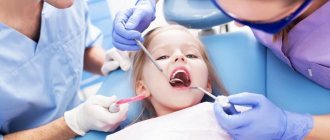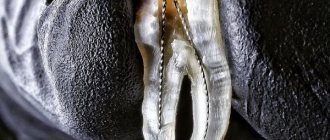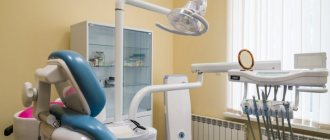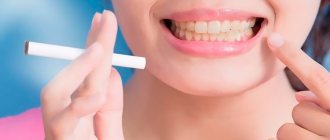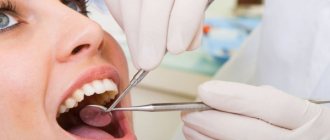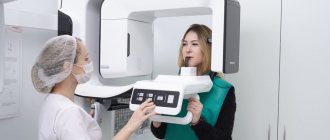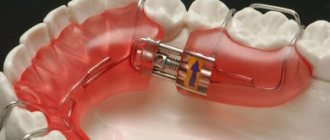Hundreds of pages on the Internet give very “useful” advice on how to get rid of toothache and cure caries with folk remedies. Do you carefully study such pages, memorize all the advice, and also take notes on the particularly tricky ones? When you have a toothache, is it easier for you to read a spell for the waxing moon, kiss a live toad at midnight and rinse your mouth with a decoction of urine from a five-month-old baby, rather than go to the dentist? Then it’s time for you to find out that there is dentistry without pain, that in a modern clinic absolutely painless treatment of caries is possible, and a good doctor will do everything possible to make you feel, if not at home, then at least not like in a torture chamber in the dental chair.
Some people have such a serious fear of dental treatment that they are ready to endure the pain until the last moment, put up with tooth decay and come to the doctor only when the pain is not relieved by any analgesics and because of it the fear is temporarily dulled. Unfortunately, with such a late application, all that remains is to remove the diseased tooth, and the person leaves the clinic happy (he got off easy, he didn’t even have to treat!) and disappears from the dentists’ field of view until the next time - when the next diseased tooth has to be removed. Doctors can tell many stories about relatively young people who were left with practically no teeth, but did not even try to at least replace the lost dental units with a prosthesis, since they could not save theirs. And this is despite the fact that today there are many methods of prosthetics without grinding teeth, which is usually the most feared.
It would be stupid to reproach and shame a person for something for which he is not to blame - after all, none of us fully knows how to control our fears. Therefore, we will neither cause a feeling of guilt nor put pressure on a sense of responsibility. We will simply tell you what methods of painless dental treatment exist today and how you can make up your mind and finally trust the dentist.
Laser in dentistry
There are several types of dental laser: diode, argon, neodymium, erbium, carbon dioxide. The difference between the devices is in power, wavelength, point or constant flow of pulses. Each type of laser beam is used for specific procedures. It is used with equal success for therapeutic treatment and surgical intervention.
Possibilities of laser dentistry
Dentistry using laser is universal. Today, professionals can treat not only caries, but also various gum diseases and combat many problems. Modern technologies allow for high-quality hygiene.
Is the tooth badly damaged? The laser will help cure it. Moreover, you do not have to visit the clinic 5-10 times. Usually 1-2 receptions are enough.
Are you correcting your bite? The laser will allow the doctor to take an ideal impression of the teeth and accurately select the necessary braces. Your child will be captivated by the process. He will not resist correcting the bite.
Do you want to save your child from gum disease and other problems? In this case, it is also worth using the services of laser dentistry.
Do you need oral surgery? And in this case, you can use modern technologies. They are suitable, for example, for trimming the frenulum of the tongue. Moreover, all operations are carried out in the shortest possible time and do not cause pain or discomfort. The interventions do not require long-term recovery and do not lead to severe bleeding or the occurrence or spread of infection.
Therapeutic laser dental treatment
In therapeutic dentistry, laser therapy is used in the following cases:
- Relieving inflammation.
When treating gingivitis, stomatitis or herpes, electromagnetic waves are directed to the source of infection and destroy pathogenic bacteria. - Sterilization.
Periodontal pockets and tooth canals are treated with a diode laser before installing a filling. - Treatment of caries.
Affected tissues are effectively removed using an erbium apparatus. - Filling.
Curing of light polymer fillings occurs under the influence of an argon laser. - Teeth whitening.
The laser beam activates the hydrogen peroxide-based whitening gel without heating the tooth tissue, that is, without the risk of overheating or burning the pulp. Thanks to the local pulse effect, the patient does not experience discomfort during the procedure.
Problems eliminated by laser beam
These properties allow the laser to be used to take the following therapeutic measures:
- removal of dental stones;
- treatment for periodontal diseases (gingivitis and periodontitis);
- getting rid of the consequences of caries and granuloma.
The disinfecting and biostimulating effect of using laser dental equipment makes it possible to fight the following infectious diseases:
- herpes rashes on the lips;
- aphthous stomatitis;
- ulcers;
- painful cracking in the corners of the mouth.
Practice has confirmed the high efficiency of laser equipment when performing the following therapeutic procedures:
- decreased sensitivity of enamel and its whitening;
- sealing fissures in children's teeth and correcting wedge-shaped defects;
- installation of implants;
- correction of various defects of the oral cavity.
It should be noted that getting rid of such a dangerous disease as granuloma using a laser beam is not accompanied by tooth extraction, but can be done conservatively, using transcanal dialysis:
- after analyzing the x-ray and external examination, a diagnosis is made;
- the canal (or filling, if it was previously installed) is opened, expanded and processed with aseptic material;
- a waveguide connected to the laser emitter is inserted into the prepared channel;
- the granuloma is exposed to the targeted beam for the required time;
- the liquid inside the granuloma evaporates, the capsule narrows, the tooth root is sterilized;
- the channels are disinfected and sealed;
- adhesive and filling material is applied.
Further, if there is a need for this, work is done to model the crown and install it.
The use of anesthetics and antibiotics is kept to a minimum, which is very important when treating children and adults prone to allergic reactions.
Laser treatment of patients is possible at the initial stage of periodontitis and is carried out in the following sequence:
- After diagnosis, the doctor removes plaque and hard deposits, including under the gum;
- Photoditazine is applied to the treated areas, which is washed off after 10 minutes;
- The laser emitter is directed to the subgingival area.
The treatment course involves two sessions with a six-month break.
Application of laser in dental surgery
During surgery, a laser device is used for painless and bloodless tissue dissection—during the procedure, the beam instantly seals the vessels. The incision is smaller and thinner than with a scalpel, so no stitches are required during the operation, and after the wounds heal there are no scars or scars. In dental surgery, laser is used to solve the following problems:
- Removal of tumors.
The liquid inside the papilloma, cyst or fibroma is evaporated under the influence of electromagnetic waves. - Carrying out dental implantation.
Thanks to the laser, implant installation is delicate. Thanks to laser implantation, the soft tissue contour is better preserved. - Plastic surgery of the frenulum of the lips and tongue.
The fold is excised lengthwise or crosswise depending on the clinical case. - Gum correction.
Excess tissue is trimmed before prosthetics, filling or orthopedic treatment. The laser is also used for gum surgery after implantation or if there are other indications.
Icon: caries treatment without preparation
In the early stages of caries, Icon dental treatment is successfully used when drilling is not required at all. Dental surfaces are treated with a special chemical composition, which, permeating the tissues, disinfects and seals them. Essentially, a special filling is placed on the tooth, but you don’t have to drill into it for this filling. Unfortunately, treatment of caries without Icon preparation can only be used at the beginning of the development of the disease, when there is not yet a deep cavity in the diseased tooth. Therefore, for those who want to be treated quickly and painlessly, without an unpleasant preparation procedure, it is better to consult a doctor at the first signs of caries.
Veronika Aleksandrovna Ivantsova, dentist at the 32 Dent clinic: “The Icon dental treatment today is the most famous and popular technique that does not require drilling of dental tissue. But besides this, there are other technologies without preparation: ozone therapy, when diseased cells are removed by ozone cleaning, a non-contact abrasive technique, which is very similar in its mechanism of action to regular teeth brushing. In a modern, well-equipped clinic, the patient can always be offered a choice of several options for painless and completely comfortable treatment.”
Indications and contraindications
With the help of electromagnetic waves, it is possible to achieve positive therapeutic results even in the most difficult situations, and the absence of the need for anesthesia allows the device to be used for people with allergies to painkillers. The use of laser in dentistry is one of the safest and most effective methods of treatment, which is indicated for almost everyone. However, there is still a small list of contraindications.
- Nervous system disorders
- Late stage diabetes mellitus
- Kidney failure
- Oncological diseases
- Pregnancy (1 - 6 months)
- Open tuberculosis
- Elevated thyroid hormone levels
- Allergy to sun rays
Attention!
Insufficient qualifications of a specialist and failure to comply with safety rules significantly increase the risk to the patient’s health during laser treatment. Contact only trusted clinics, where your eyes are protected from radiation with special glasses, and the room is brightly lit during the procedure.
What is a dental cyst?
A cyst is any cavity formation that forms inside the jaw bone or in the gum and limits the penetration of infection from the source of inflammation into healthy tissue.
A dental cyst develops very slowly and its development begins with the penetration of infectious agents, microbes and inflammatory products into the tissue around the tooth root, which the body cannot cope with. The human defense system tries to autonomously fight inflammatory and necrotic processes but, unfortunately, is defeated. To prevent further spread of the infection, a capsule is formed filled with decay products of dead and infected bone cells; the body tries to prevent the infection from spreading to surrounding tissues.
!Important: The main inconvenience and problem is that such hidden cystic processes, regardless of location (no matter in the jaw, in the abdominal cavity or in the ovary), always develop asymptomatically and unnoticeably. And the most annoying thing is that these formations are found only during an exacerbation, when a surgeon is already needed.
Now in our clinic there is a special diagnostic case “CT scan for searching for hidden cysts.”
All dental cysts will have to be treated, even if nothing bothers you. In order not to waste time, it is better to delay, as they gradually increase and involve the surrounding tissues in the pathological process. The result of this progression of the disease is periostitis, known to ordinary people as “flux”. A pronounced clinical picture of inflammation develops with pain, swelling and hyperemia, the main treatment for which, unfortunately, will only be tooth extraction followed by extraction of the cyst.
!Important: Currently, there is a lot of information about the treatment of cysts with laser. However, the confusion of information makes it impossible to understand the problem of using medical lasers to treat cysts.
Currently there is:
- Laser sterilization of canals using a SIRONA laser or other devices.
Plus : Modern, fashionable, there is an illusion of expensive quality. Disadvantage : the price is inadequate, there is no medical evidence of the advantages of this type of treatment over other methods of canal sterilization. Very questionable marketing.
- Laser surgery of the cyst shell itself, laser disinfection of the cavity in the bone.
Plus: Super speed of the operation, burning out the cyst occurs literally in seconds. Minus : unforgettable smell, heals worse, the result of healing of the wound surface after a laser burn is worse and longer than after surgical removal of the cyst. We haven't used it for two years now.
!Important: Please understand that laser canal treatment is a marketing term that duplicates the classic treatment of root canals with a contact antiseptic. Despite the modernity of this method of dealing with the problem, such as “laser cyst treatment”, its effectiveness remains in doubt, and therefore you should not rely too much on it.
Advantages of the method
Today, laser dental treatment in Moscow is widespread in dentistry. Despite the high cost, it is deservedly popular among patients who appreciate the advantages of laser treatment.
- Delicacy.
The absence of unpleasant noise and vibrations makes the operation easier. - Short duration of procedures.
Depending on the nature of the manipulations, the process takes from two to twenty minutes. - No need for anesthesia.
The device does not touch the tissues of the teeth and gums, but acts at a distance, so there is no pain from mechanical action. - Accuracy.
The rays are directed only at the affected tissues, healthy areas are not damaged. - Reduced injury rates.
The laser seals the vessels and edges of the wound, so even complex operations do not require stitches and bandages to stop bleeding. - Fast rehabilitation.
After treatment, the incision heals in a matter of hours and is not accompanied by swelling or pain.
Terrible drills are a thing of the past
The notorious drills, which with their sound could scare away all patients waiting for an appointment, and with the “elegance” of their work resembled a jackhammer, are a thing of the distant past. Today, dental clinics are equipped with modern, completely silent units that do not get on the nerves of patients with unpleasant buzzing and disgusting vibration. Even if the patient has to drill a tooth, today this can be done without noise or discomfort. Agree that the lion's share of hostility to dental treatment was formed precisely because of the fear of treating teeth with a disgustingly noisy “dental jackhammer.” Now that the likelihood of encountering an old-generation drill has been reduced to almost zero, you can go to the dentist with confidence and confidence.
Other equipment in dental clinics has also changed. Today, treating teeth has become much more pleasant and convenient than just 10 years ago. And technologies are constantly developing: new, comfortable, painless solutions appear. Today, prosthetics are not at all as uncomfortable and time-consuming as they used to be. It is quite possible to install a prosthesis without grinding the teeth, and implantation has reached such a high level that the degree of difficulty for the patient is similar to a regular tooth extraction.
But, of course, it’s better not to resort to prosthetics - if you pull yourself together from time to time and still visit the dentist for treatment, there is every chance of meeting old age with your own teeth.
Dentist at the 32 Dent clinic Mukhin Pavel Nikolaevich: “As paradoxical as it may sound, a person who is afraid of dental treatment needs to go to the dentist much more often than a “fearless” patient. Regular visits to the doctor will help to identify caries in time and cure it when neither drills nor dental pulp removal and canal cleaning are needed. Professional hygiene and annual medical examinations will help you maintain your dental health at a decent level and save yourself from serious dental treatment.”
Treatment of cysts and granulomas with laser
Granuloma usually occurs as a result of poor treatment of caries and pulpitis. The disease is asymptomatic at the first stage, and is later accompanied by swelling of the gums, pain and darkening of the enamel. When treating dental granuloma with a laser, the affected area is drilled and an electromagnetic beam is sent into the hole, destroying the contents of the cyst and sealing the vessels. The doctor then installs a filling.
Without timely treatment, the granuloma develops into a cyst, which can provoke even more serious complications. Gentle treatment of dental cysts with a laser is considered a good method, as it allows you to save the tooth. The procedure takes place without pain, stress and stitches. In addition, treatment of a dental cyst with a laser without removal eliminates the risk of re-development of inflammation. The patient’s comfort and the absence of complications justify the additional costs, because the price when treating a dental cyst with a laser is higher than when using other methods.
Application of enzyme gel –
Instead of a drill, special enzyme gels can be used to remove caries, which dissolve only the tissues affected by caries, without touching the healthy hard tissues of the tooth. This is an excellent tool for use especially in children's practice. There are a large number of manufacturers of such products, and one of the options is BRIX 3000 enzyme gel, the principle of operation of which you can see in the videos below.
The enzyme gel is introduced into the carious cavity for about 2 minutes, after which the softened carious tissues are scraped out of the carious cavity using a special tool. After this, the cavity is washed out and filling of the tooth can begin. True, in some cases it may be necessary to use a drill to smooth out the edges of the tooth enamel hanging over the carious cavity.
Application of enzyme gel –
How much does laser dental treatment cost?
As a rule, prices for laser dental treatment in Moscow depend on the type of dental disease and the severity of the pathology. You must be prepared for the fact that in any case it will be significantly higher than when using classical methods. Treatment of caries at the initial stage of the disease will cost from 800 rubles. The price for treating a dental cyst with a laser without removal will be approximately 1,500 to 2,000 rubles. For laser whitening you will have to pay from 8,000 to 11,000 rubles.
Obviously, the high cost of therapy is the only drawback of this technology. However, numerous rave reviews about laser dental treatment confirm the fact that patients are willing to pay for comfort, efficiency and peace of mind, the absence of irritating drill sounds and the frightening prospect of using anesthetics.
All the best for children
Laser therapy is successfully used in the fight against caries even in baby teeth, although only at the initial stage of the lesion. It is advisable for the child to be at least seven years old, but diligent and calm children can take advantage of the latest technology at a younger age.
For the treatment of small patients, the following rules apply:
- it is necessary to use only equipment with the ability to adjust the radiation power;
- During the procedures, a slight tingling sensation may occur, which the child should be warned about.
All other advantages of laser dentistry are common to children and adult patients.
Examples of work “Before” and “After”
Gap between the front teeth - diastema
Case: Gap between the teeth and complaints about the aesthetics of the smile Work: 6 Empress Esthetic veneers on the front teeth and a metal-ceramic bridge on the lateral chewing teeth on the left Time: 6 days Number of visits: 3 Cost: 135,000 rub.
Restoration of anterior teeth with Empress veneers
Case: the patient complained of unsatisfactory aesthetics of the front teeth and a gap between the teeth.
Restoration of front teeth with ceramic veneers (May 2012)
Case: I went to the clinic with a complaint about the unsightly shape and position of the central incisors on the upper jaw.
Aesthetic restoration - lumineers (July 2013)
Case: the patient complained of unsatisfactory aesthetics of the anterior teeth (enamel color, crooked incisors).
How to treat caries: the main stages of the treatment process to be completed
Treatment of caries always begins with diagnosis, which establishes the stage of development of the disease. Diagnostic measures for caries may include a visual examination, the use of special caries indicator drugs, a laser, and radiography (a targeted picture is taken).
Based on the data obtained during diagnosis, the optimal caries treatment method for a specific clinical case is selected. Most often, a classic treatment regimen is used, which involves drilling the tooth with the removal of destroyed tissue, treating it with antiseptics and drugs that destroy the infection, and restoring the natural crown of the tooth with a light-curing filling.
Take a short test and calculate the cost of treatment!
Take a short test
How to prevent caries so that you have to treat your teeth less often?
Successful prevention of caries begins with a visit to the dentist's office, because only a specialist, after an examination, will determine the condition of your teeth and be able to choose the right care program for you.
Please note that caries prevention is not only regular brushing of teeth, but also proper nutrition, taking vitamins, and giving up bad habits! In addition, to effectively prevent caries, you must regularly visit the dentist for examinations and professional teeth cleaning.
Advantages of contacting Medikastom
- Experienced specialists. Our laser dentistry clinic has a staff of highly qualified doctors.
- Full range of services in centers (in Butovo and other areas).
- Availability of services. Thanks to this, almost everyone in Moscow can take advantage of it.
- 24/7 service.
- Comfortable treatment conditions. We are always ready to offer you coffee. During the procedures, you can watch your favorite movies.
- No queues. Modern computerized maintenance systems make it possible to avoid them.
Contact Medikastom! Call: +7 (495) 711-80-36 or. We are located near the metro station "Dmitry Donskoy Boulevard" (Severnoye and Yuzhnoye Butovo district), metro stations "Izmailovo" and "Pervomaiskaya".
Our 24-hour dentistry provides the widest range of services. We are always ready to provide you with services such as periodontics and tooth extraction.
Dental implantation
- — cutting the gums to install implants,
- — opening of implants after their engraftment,
- — antiseptic treatment of the implant bed,
- – treatment of peri-implantitis – inflammation around installed artificial roots
Dental restoration through implantation is one of the main indications for the use of a laser device. “Laser scalpel” allows you to create not only aesthetics of the gums, but also significantly reduce the rehabilitation period due to less tissue trauma: swelling and pain are reduced, bleeding from the wound stops, tissues heal 2 times faster.
Cost of services
If treatment is started on the day of treatment, consultation and treatment plan are free
| Extended consultation with a surgeon | 1000 rub. |
| Permanent tooth extraction is simple | RUR 2,500 |
| Complex permanent tooth extraction (category 1-3) | 4,000 rub.-7,000 rub. |
| Removal with dissection and flap folding | 9,000 rub. |
| Removal of 8th teeth | from 9,000 rub. |
| Opening and draining the abscess | 1,500 rub. |
| Applying (removing) one suture | 300 rub. |
| Removal of a benign neoplasm on the mucous membrane | from 3000-5000 rub. |
| Removal of migratory granuloma | 10,000 rub. |
| Osteotomy, alveolotomy, removal of exostosis 1 tooth | 1,500 rub.-2,000 rub. |
What are the clinical manifestations of a dental cyst?
In the first stages of the disease, the patient does not feel the problem at all. The only sign of pathology may be slight discomfort when pressing or a feeling reminiscent of crepitus (crunching). As the cyst grows, the following symptoms appear:
- a feeling of an “overgrown” tooth, a feeling of fullness, twitching, or fullness in the affected area;
- aching pain in the tooth or even in the entire jaw when biting, which makes differentiation difficult (typically worse at night);
- problems with the chewing process (discomfort and increased pain);
- an increase in the size of the gums on the affected side (its swelling, and with an exacerbation of infection - severe hyperemia);
- swelling of the face, in particular the cheeks on the affected side due to impaired functionality of the lymphatic system.
During the period of an acute infectious process in the area of the cyst, that is, during the development of flux, general signs of inflammation are observed: increased body temperature, headache, enlargement and soreness of the nearest lymph nodes. At such moments, the pain becomes sharp and throbbing.
